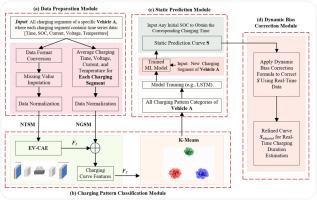A novel framework for vehicle charging pattern recognition and charging duration prediction based on EA-CAE and K-means clustering
IF 9.6
Q1 COMPUTER SCIENCE, ARTIFICIAL INTELLIGENCE
引用次数: 0
Abstract
Accurate prediction of electric vehicle (EV) charging duration is critical for improving user satisfaction and enabling efficient real-time charging management. This paper proposes a dynamic charging duration prediction framework for EVs, composed of four coordinated modules: data preprocessing, charging pattern classification, static prediction, and dynamic bias correction. First, raw charging data collected from the Battery Management System (BMS) is cleaned and normalized to address missing and abnormal values. An enhanced convolutional autoencoder (EV-CAE) is then employed to extract multi-scale temporal features, while K-Means clustering is used to identify representative charging behavior patterns. Based on the classified patterns, the static prediction module estimates the current charging duration by leveraging historical data and pattern labels. To enhance adaptability under dynamic conditions, a bias correction mechanism is designed, integrating linear, logarithmic, proportional, and deep learning-based strategies to adjust the prediction results in real time. Experimental results on real-world EV datasets demonstrate that the proposed framework significantly improves prediction accuracy. In particular, the dynamic correction module increases the coefficient of determination (R²) from 0.948 to 0.960, while maintaining robust performance under fluctuating charging behavior and low-temperature conditions. These results validate the practical applicability and engineering potential of the proposed method for real-time charging duration estimation in intelligent EV charging systems.

基于EA-CAE和K-means聚类的车辆充电模式识别和充电持续时间预测新框架
准确预测电动汽车(EV)充电持续时间对于提高用户满意度和实现高效的实时充电管理至关重要。本文提出了一种电动汽车充电持续时间动态预测框架,该框架由数据预处理、充电模式分类、静态预测和动态偏差校正四个协调模块组成。首先,从电池管理系统(BMS)收集的原始充电数据被清理和规范化,以解决缺失和异常值。然后使用增强的卷积自编码器(EV-CAE)提取多尺度时间特征,同时使用K-Means聚类识别具有代表性的充电行为模式。基于分类模式,静态预测模块利用历史数据和模式标签来估计当前的收费持续时间。为了增强动态条件下的适应性,设计了一种偏差校正机制,集成了线性、对数、比例和基于深度学习的策略,实时调整预测结果。在实际EV数据集上的实验结果表明,该框架显著提高了预测精度。特别是,动态修正模块将决定系数(R²)从0.948增加到0.960,同时在波动充电行为和低温条件下保持稳健的性能。这些结果验证了该方法在电动汽车智能充电系统中实时充电时间估计的实用性和工程潜力。
本文章由计算机程序翻译,如有差异,请以英文原文为准。
求助全文
约1分钟内获得全文
求助全文
来源期刊

Energy and AI
Engineering-Engineering (miscellaneous)
CiteScore
16.50
自引率
0.00%
发文量
64
审稿时长
56 days
 求助内容:
求助内容: 应助结果提醒方式:
应助结果提醒方式:


